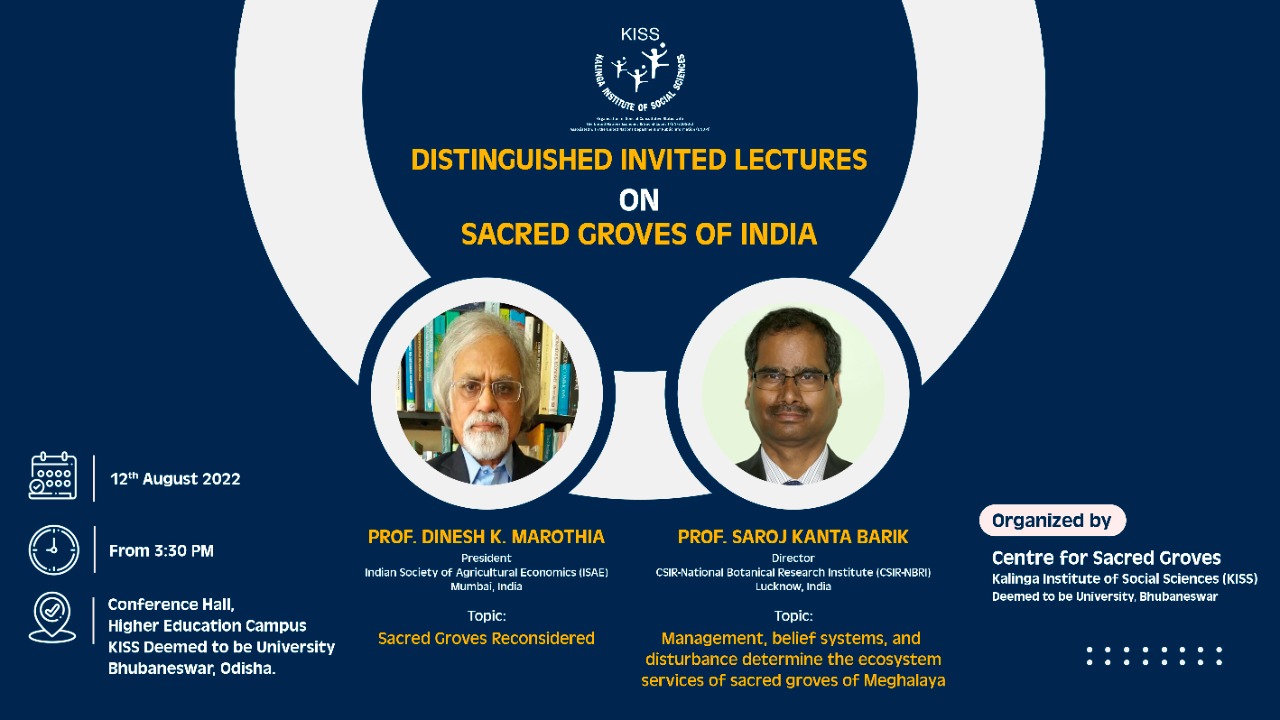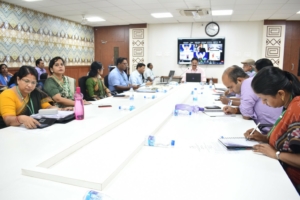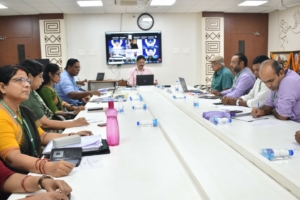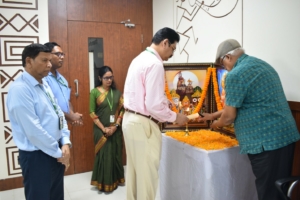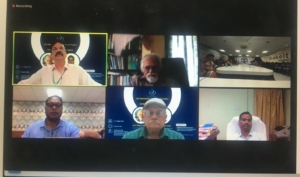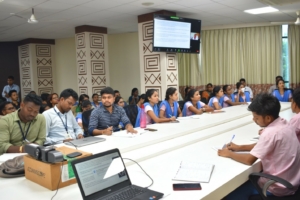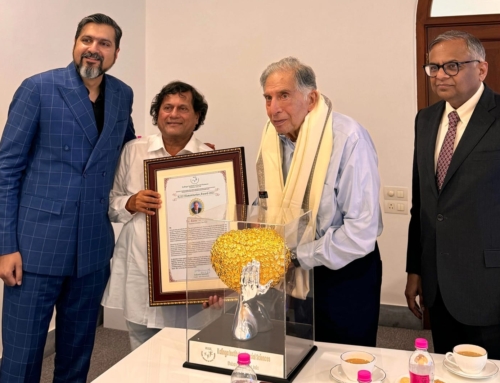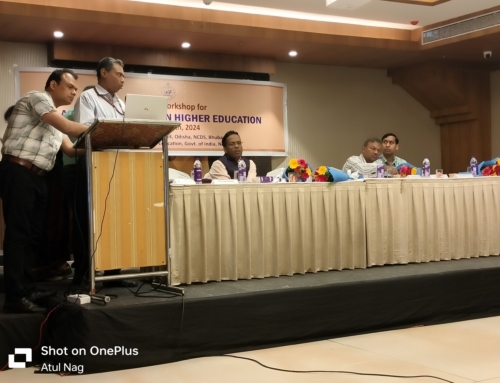The Centre for Scared Groves, KISS Deemed to be University organized a webinar on ‘Sacred Groves of India’ on 12th August, 2022. Professor Dinesh K. Marothia, President, Indian Society of Agricultural Economics, Mumbai and Former President, National Institute of Ecology, New Delhi and Professor Saroj Kanta Barik, Director, CSIR-National Botanical Research Institute, Lucknow were invited as the distinguished speakers.
Delivering the welcome address, Professor Deepak Kumar Behera, Hon’ble Vice-Chancellor, KISS-DU highlighted the perceptions of sacred groves, a traditional form of community-based conservation by our Indigenous people through spiritual or cultural engagement. He also pointed that there is no accurate documentation available for the status of Sacred Groves (SGs). However, nearly 70 countries possess Sacred Groves or Sacred Forest across the globe. There are fourteen thousand Sacred Groves in India, out of which 169 SGs are functionally available in Odisha. These SGs consciously created cultural devices and created strict norms as “Unseen Power”, traditional belief system to preserve our biodiversity and these SGs are pool of resources in respect to economically and anthropologically prospective to tribal people. He also mentioned that multidisciplinary prospective are lacking and common methodological framework must be needed topreserve, conserve and utilize our Sacred Groves. He also remembered the efforts of Madhav Gadgil in area of sacred groves research. Furthermore, Dr. Behera justified the reasons behind establishment of Centre for Sacred Groves at KISS-DU, while sharing his concerns about the Sacred Groves in Odisha by emphasizing its lack of geographical mapping and absence of structural management; so our SGs like Zahira / Gram Sala / Thakurama / Ghuspennu / Lohapenu and others are about to extinct and there is a dire need to conserve. He underlined that KISS-DU will present a platform for second generation researches in all possible domains by engaging multidisciplinary approach through the Centre established in the University.
The introduction of the webinar was given by Dr. Manoj Kumar Behera, Director, Centre for Scared Groves, KISS Deemed to be University and Dr. Krupasindhu Nayak, Assistant Professor, Sociology introduced the esteemed speakers.
Professor Saroj Kanta Barik delivered his novel research on the topic of “Management, belief systems, and disturbance determine the ecosystem services of sacred groves of Meghalaya”. He considered Scared Groves as national heritage and need to be protected, because 99% of our SGs disturbed because of the human intervention. All the factor of ecosystem structure, function, process and benefits are depended on size of Scared Groves that majorly affected by its management, village system and disturbance. These SGs need expansion, Government involvement for their existences. According to his research 125 Sacred Forest across 900 hectares lands in Meghalaya has been well documented. These Meghalayan’s Sacred Groves managed by Lyngdoh (priest), Raij (king) and Dolloi (local Chief) and traditionally conserved on religious ground. These forests are intricately linked with Scoio-Cultural life of the Indigenous people and are number of rites, ritual and religious ceremonies are associated with these groves. He also justified that Sacred Grove serves as home to number of plants and animals’ species, which are endemic to Meghalaya and are biodiversity refugia for many plant and animal species. Empirical data on Sacred Groves ecosystem goods and services are extremely important to demonstrate the cost and benefits of sacred forest conservation, which can be understood by the communities. He also urged to Centre for Sacred Groves, KISS-DU to identify and characterize ecosystem, develop a framework, access quality and quantity ecosystem attributes of sacred groves.
Speaking on the occasion, Professor Dinesh K. Marothia delivered a talk on ‘Sacred Groves Reconsidered’. The sacred groves are sacred common pool resources with distinct socio- culture- ecological- political attributes and considered as “Sacred natural sites”. Sacred natural sites defined as area of land or water having spiritual significance to people and communities (IUCN). It is highly complex ecosystem in terms of size, socio-ecological-ethnic-political characteristics and only be meaningfully analyzed using an interdisciplinary framework. He opined that traditional ecological knowledge is crucial for preservation of sacred forest across the world. He urged to include the different provisioning, regulating, cultural and social services to improve ecosystem. He also established a connect between Sacred Groves System with Sustainable Development Goals (SDGs).
The distinguished lectures were summarized by Dr. Kannu Charan Mahali, Director General, KISS-DU. He expressed that Sacred Groves control the living and worshiping pattern of tribal life. He also recollected some of his memories with tribal rituals in Jahira (sacred groves) among the Santhal, Mahali and Ho tribes in Mayurbhanj district, Odisha. Further, Professor Siba Prasad Adhikary, Professor Emeritus, KISS-DU concluded that sacred groves are the temple for the tribes. He said that some of the valuable resources like forest, land and water has been destroyed in the name of development and this generates the need for restoring cultural resources.
The question answer session was moderated by Mrs. Sangeeta Parida, Faculty, Botany and coordinated by Dr. Deepak Kumar Ojha, Assistant Professor, KISS-DU. The distinguished lecture concluded with a brief closing address by Professor N. C. Das Emeritus Professor, KISS-DU and a formal vote of thanks proposed by Dr. Priyoneel Basu, Director Research, KISS-DU.

